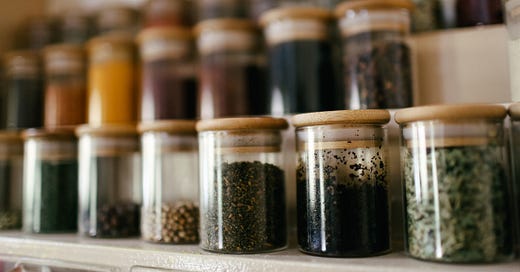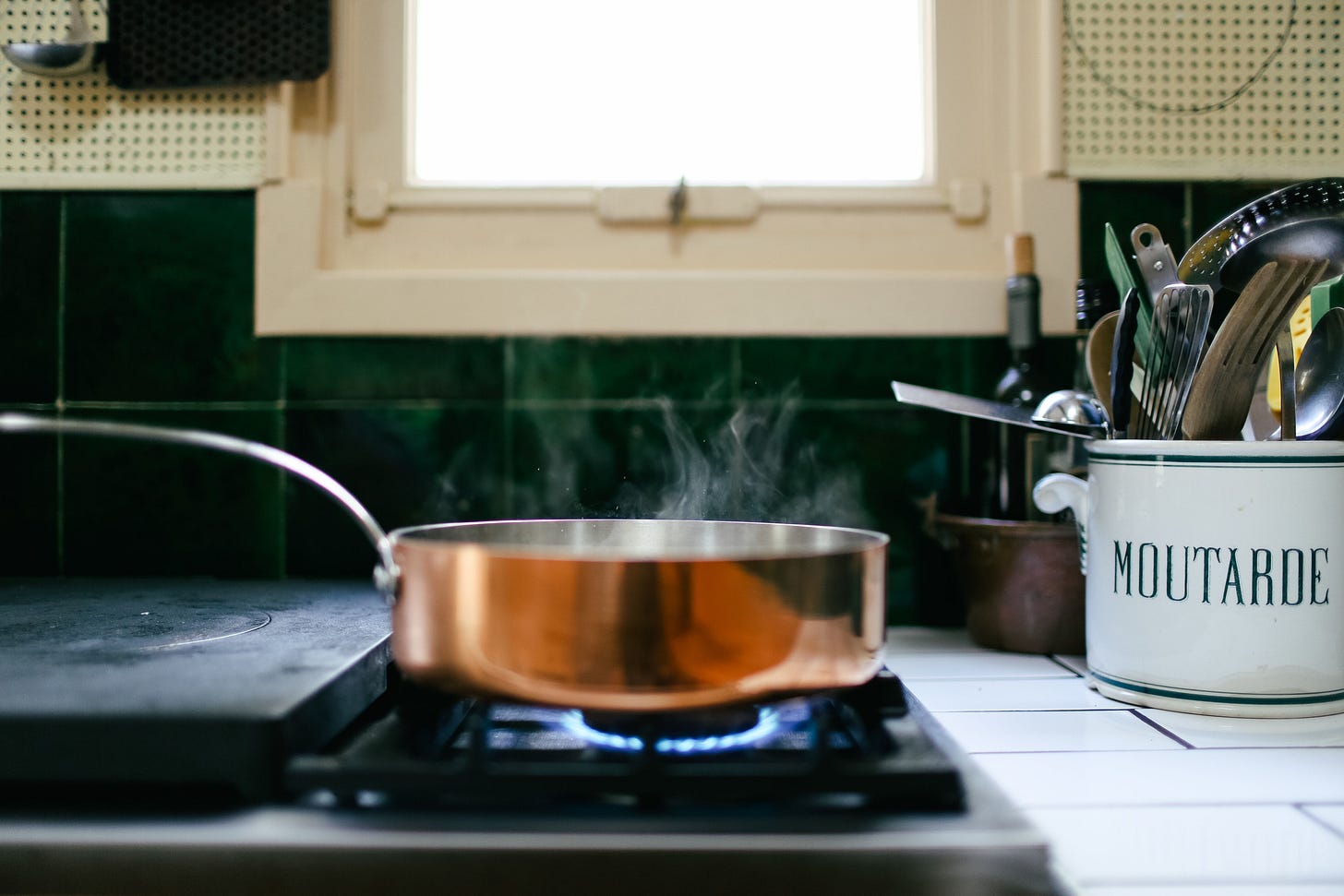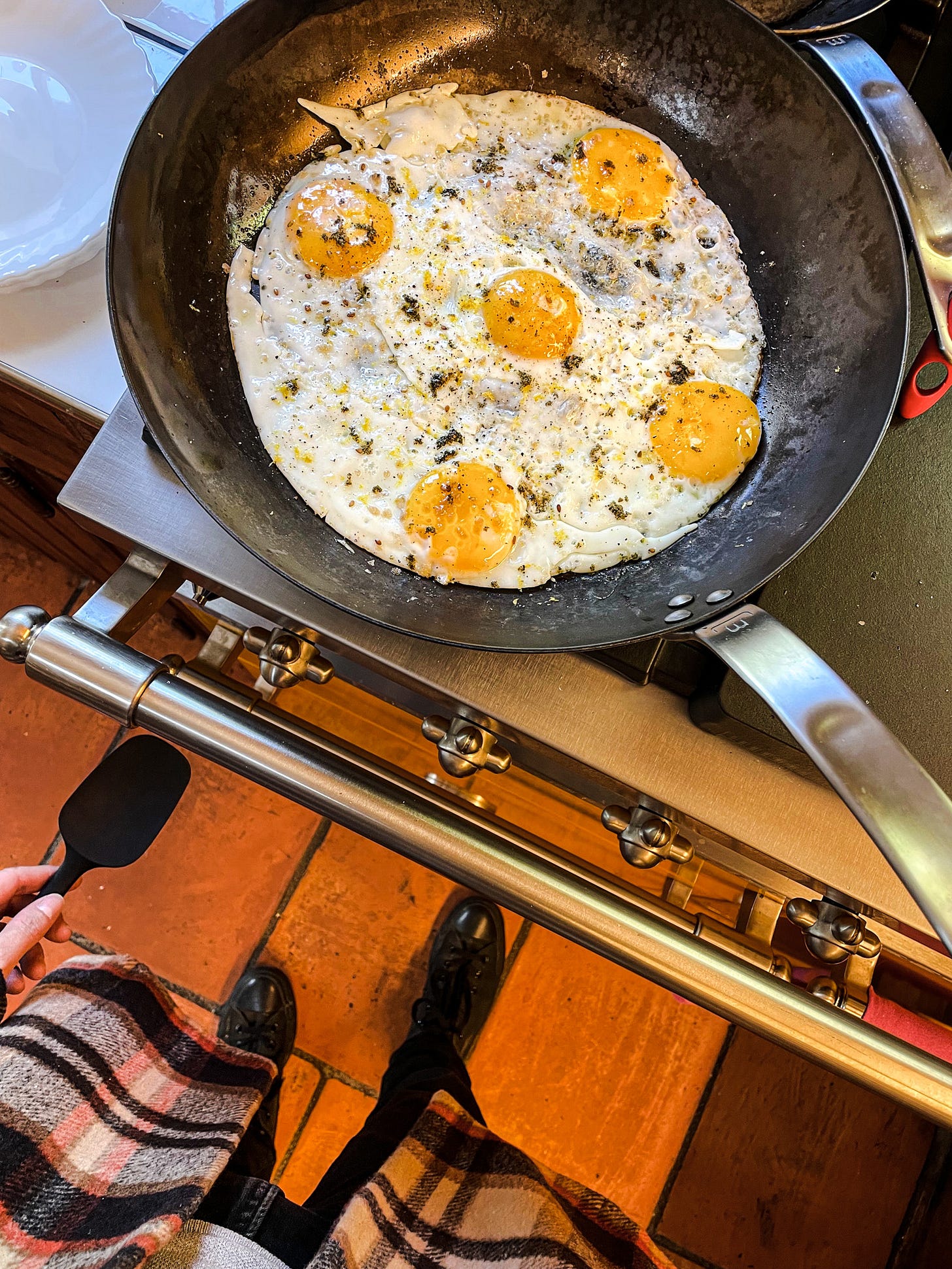okay, perfect #10: recipe-free cooking and recipes aren't oil and water, they go hand-in-hand
Y'all...there's nuance here
TL;DR? I LOVE RECIPES! I just don’t think they are good teaching pedagogy. Also, Chris (my husband and best friend) just released his debut solo album and its’ called….Okay, Perfect. Just like this newsletter. (It’s our company name, our life motto, and the theory behind the school)
When I started the Courageous Cooking School, I didn’t set out to send recipes to the grave.
Not even a little bit!
I write recipes for a living for goodness sakes! I’m a cookbook author (book forthcoming in 2024. My manuscript will be done by the end of 2022 and includes over 100 recipes!). I adore recipes. AND I adore cookbooks. My collection at La Peetch is over 200 large, and at home another 200 or so. (I blanche to think at how much money I’ve given the cookbook industry over the past 10 years!)
In fact, I love cookbooks so darn much that I keep. collecting. them. At a rate of about 5-10 a month.
(Some of our Burlap & Barrel Spices on display at La Peetch)
Recipes and cookbooks are my love language. Especially because when I was learning to cook, I didn’t have access to many recipes (this was pre-internet food blog recipe heaven that we have now), so I DEEPLY appreciate recipes.
BUT…recipes are a hotly mediocre pedagogical tool to teach cooking in a broad way.
They are a piece of how we should explain and teach cooking, but they shouldn’t be the only way we teach cooking.
Think of it this way…If we taught any other subject the way we teach cooking, it would be considered a huge issue. For example, if a teacher taught reading, math, science only in the context of if you put ‘A+B together you get C’ and not in a wider contextualisation of how these things function, we’d fire that teacher immediately. Why? Because we’ve discovered that human brains love context, and love figuring out how things work. It’s why kids often love science class, because there is a wider application and there is a method to the madness. Imagine trying to teach sports in the context of ‘throw ball into net’ with no nuance. And no explaining the mechanics of how it works.
“Watch me, do what I do, and then go forth young padawan. May the force be with you.” THIS is how we teach cooking. (And like…If we recall from Star Wars, it often leads to the Dark Side. Sorry, I had to. #nerd)
And A LOT of people give up on cooking because of recipes. Because they tried it, didn't have any context to the explanations, and then felt like they’ve failed. Wanna know why I know this? Because before I built the Courageous Cooking School, I asked over 500 people (#marketresearch) how they learned to cook, and why they almost quit/or did quit trying to learn.
Often the answer was recipes and cookbooks themselves.
Cooking is one of those skillsets that we’ve never really spent much time figuring out the efficacy and pedagogy of teaching. Probably because we don’t view it as a core educational skill, it’s historically relegated to the domain of professional kitchens (learning through doing, culinary school, and watching mothers/grandmothers) and housewives (learning from cookbooks and from their mothers/grandmothers). But actually teaching cooking to people who cook regularly and from a place of joy? Never has been a priority.
Rote recipes has been the way to teach and often remains that way, even at the big culinary schools. When I was in culinary school, I literally had to watch someone make a recipe (often two to three) and then go into a practical where I made ONE recipe. And was judged on how perfect it was to their vision/taste of the dish. I’d get perfect marks (well-plated according to the photo, “perfectly seasoned”), and then taste the food…and often times? It was inedible.
Because…We all have different beliefs, taste buds, connections to ‘what is tasty and delicious’.
When I created the Courageous Cooking School, I simply wanted a different, novel way to approach cooking to support people to make shifts in their approaches to cooking in leaps and bounds.
So let me repeat…THERE IS NOTHING WRONG with being a recipe-based cook. It’s a great way to cook. It’s just not the best way to learn cooking especially when you have instructors with you to help you along the way. If I just show up and teach you a recipe, demo it, and then you go home and make it exactly. the. same. way. I’ve taught you nothing except how to make that dish.
If you come and actually learn what ingredients do to a flavor profile. Say…that carrots add sweetness and earthiness to a stew, that onions add a spicy aromatic quality, that garlic’s flavor comes from allicin and the age of the garlic affects the quantity so you want to check how it smells before just following the recipe, that 1/4 teaspoon of thyme won’t do diddly squat, and that the reason why we underuse our spices is because…well…we’ve been trained to by recipe-writers-like-myself because…Spices are expensive so we often use less in recipes than maybe we’d like to because…editing, thinking about cookbook sales, etc….
Learning all that?
That is when you start thinking differently about cooking food. When you can diagram a recipe and adjust it to be even more suited to your palette without thinking. When you can pivot on a dime because you have a framework for cooking, and it saves you time, energy and frustration. So when that fennel you’ve gone to three grocery stores to find and you still come up empty doesn’t ruin the meal you’re planning and you have to find a new recipe to make.
THAT is where the magic happens.
Or when you can go to a farmer’s market, find an ingredient you’ve never tasted before and can build something without having to search for a recipe online.
In the intro to La Pitchoune: Cooking in France, I say ‘Life’s just a bit more delicious without recipes’.
I don’t say KILL RECIPES! ALL RECIPES SHOULD DIE! DEATH TO RECIPES!
What I am saying is that when you let go of recipes, life gets a little bit more delicious. Because when you’re able to build to your palette, your wants, your pantry rather than the pantry of someone else? Things get a tiny bit more delicious. Just a little better. A little more…you. It’s like that with pretty much everything in life.
The more of you that you bring to the literal AND proverbial table? The more exquisite things become.
Now, get into that kitchen of yours, and create something beautiful. From a recipe or without one. And if you need a framework to build from? You know where we are (and as a bonus here’s a link to an older training where we teach our recipe-free method. Our new one is being FILMED TODAY! And will be available in time for the holidays, for free with a two week trial to our online cooking school.)
Now a Recipe!
(Which requires being a paid member of the newsletter, but I’ll give you the ingredient list! And there’s a free trial if you’d like to give it a shot before you commit)
This week, my director of photography Yayo from the TV show is here visiting us (we’re shooting new content for the Online Cooking School! And he’ll be doing this with us probably about twice a year from here on out!). And I made this egg dish for breakfast. And it was yummo, so I wanted to share with you! He also took this photo
Zesty, Olive Oil Fried Eggs
Olive oil is a great fat to use to make friend eggs. I’m all about runny yolks, but a crispy egg on the bottom is a key to my heart. And the olive oil is the key to making crispy bottoms.
What you need:
A glug of Olive Oil
Eggs
A lemon
Za’atar, or other green leafy herb
Damn Good Smoked Salt (regular is fiiiiiinnnnnne, but I use smoked on most things at the moment)
Pepper, to grind
Chilli flakes (I used Burlap & Barrel’s Silk Chilli)
Tahini (optional)
Keep reading with a 7-day free trial
Subscribe to mostly french to keep reading this post and get 7 days of free access to the full post archives.







